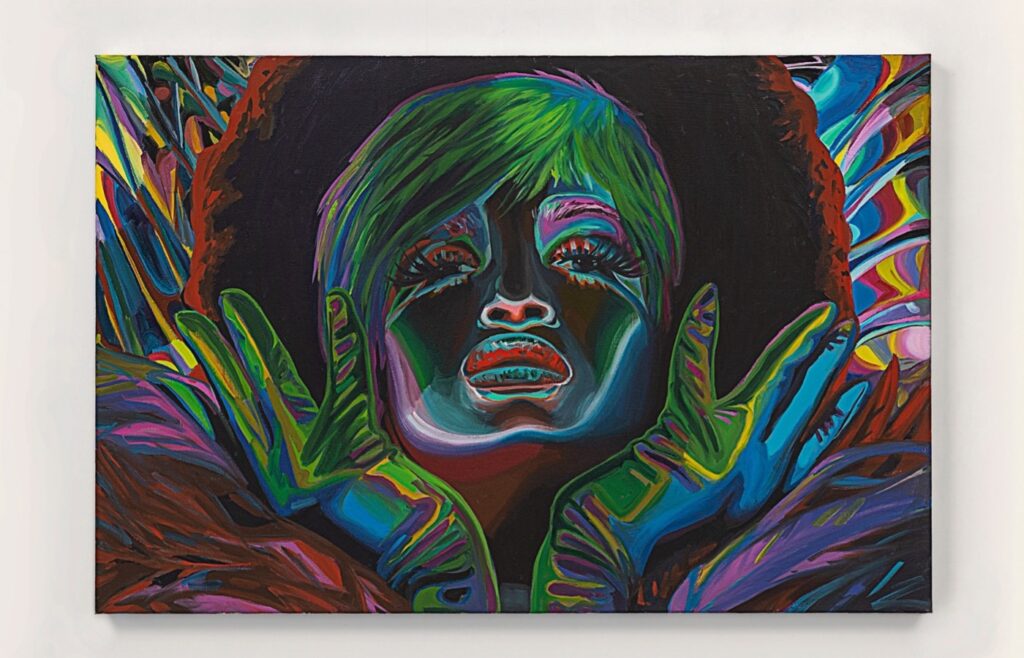Luce Gallery, Turin, Italy
08 Jun 2022 - 08 Jul 2022

Caitlin Cherry, Skete Davidson, 2022, oil on canvas, 91.4 x 61 cm (36 x 24 in), Photo PEPE fotografia, Courtesy the artist and Luce Gallery, Turin
Luce Gallery announces the solo show Max Res Default by Caitlin Cherry, in Turin from June 8 to July 8, 2022. The African-American artist continues to explore the Black femininity in the contemporary image culture and our society’s consumer-like relationship with it, depicting iridescent collaged screenshots of Black femme entertainers and influencers mined from social media, music videos, live music performances, pornography, and fashion on the web. Her palette – bold, bright, and prismatic – distorts each image’s original color, using a moiré-like technique to sometimes mimic the color swirling patterns visible when touching an LCD screen.
The exhibition brings together thirteen medium- and large-scale paintings conceived in 2022, investigating the many aspects of Black femininity as seen through The Yee-Haw Agenda, contemporary pornography, and drag culture, while also encouraging deeper conversations about gender, commodification, and forgotten histories.
The title Max Res Default references the technical term for how we prefer to view images online, with maximum resolution as the default setting. In each painting, Cherry seemingly turns up the volume to max on everything from saturated color to a multitude of imagery, to brazen sexuality. The result elevates an underrepresented Black femme aesthetic to fine art.
Video Killed the Painting Star features scenes of six distinct performances by famous Black female performers. The largest figure on the right is of porn actress Ana Foxxx, overlapped by a scene of the actress Thandiwe Newton in the acclaimed HBO sci-fi western TV series Westworld. On the left are a few close-ups of the rapper Cardi B in two separate performances, including the Houston Livestock Show and Rodeo 2019, wearing a cowboy hat, along with a background dancer. Ana Foxxx is depicted as statuesque, tall and idealized with her nude skin resembling the sheen of a highly polished bronze statue. This, combined with her size in the composition, emphasizes the artist’s interest to remove judgment of Foxxx’s profession, and, instead elevate sex workers to celebrity status. This painting also heavily references The Yee-Haw Agenda, which celebrates the Black cowboy aesthetics. The history of the Black cowboy has been largely erased from American culture, while in fact, one in four was African American. The cultural movement’s name, coined by Bri Malandro in 2018, recalls The Gay Agenda and growing concern from conservative Americans about the perceived rise in power of the LGBTQIA+ community within politics and popular culture. The Instagram account of the Texan archivist observes the trend of western wear in the Black pop culture, incorporated especially into music videos and live performances by stars, such as Beyoncé, Cardi B, Doja Cat, Lil Nas X, and Solange. They challenge common misconceptions about the territory of Blackness in the United States, which has become synonymous with the word urban. Underneath catchy branding and bejeweled Cowboy hats of celebrities lies the forgotten history of the Cowboy and the origin of Country Western music that is intertwined with the history of Black America. While cowboy culture is typically associated with rugged white males (think the Marlboro Man) and the white cowboy has become a symbol of rugged capitalist individualism and a fixture of Americana, however, the first cowboys in the United States were of Mexican and Black descent.
Skete Davidson portrays a close-up of the transgender actress Indya Moore with their chin slightly resting in their open hands and a dark red and black halo surrounding their head. Their full lips are pursed as they stare directly at the viewer through flirtatious lashes. This screenshot is based on the promotional poster for the series Pose on Netflix, where Moore plays the role of Angel. By including a transgender, non-binary person, Cherry intentionally attempts an inclusive and expansive idea of Black femininity, acknowledging that it has never aligned neatly into a sole gender category.
Cherry’s paintings promote porous and fluctuating notions of gender, sexuality, and racial performativity. The practice considers the digital interfaces from which she extracts the images as a co-producer of reality. Her kaleidoscopic works read like a glitched and chaotic LCD laptop’s desktop screen, with overlapping tabs and windows-within windows with browser tabs of porn, open simultaneously with a YouTube music video. The idea of the iconic subject is deterritorialized. This work captures the destabilized nature of Black femininity, particularly as it is surveilled and performed online.
The exhibition walkthrough video is now online